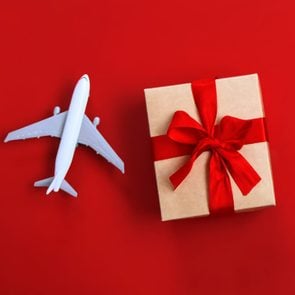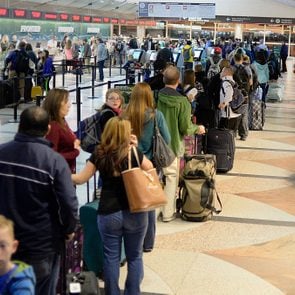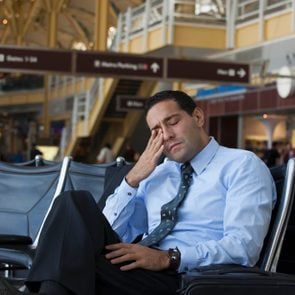This Is What a Flight Attendant First Notices About You
Updated: Apr. 17, 2024
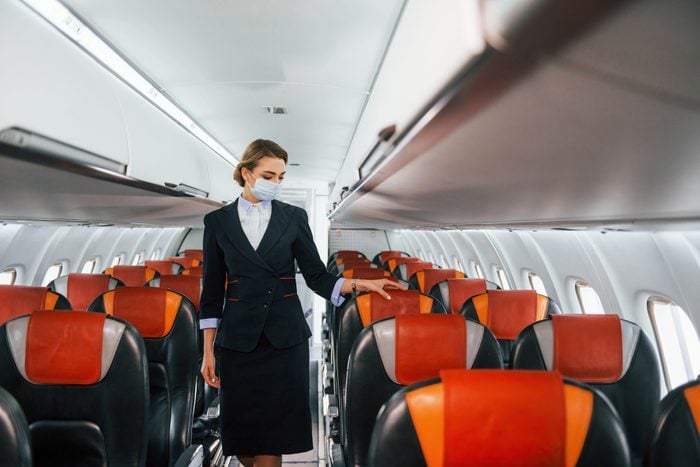
You'll be surprised by how much a flight attendant can learn about you simply by greeting you at the door
People fly for all sorts of reasons, which means their moods, their expectations and even their luggage will differ greatly. These days, with air travel unpredictable due to staff shortages caused by the global COVID-19 pandemic, the simple act of flying has taken on a whole different timbre, with new air travel rules, seemingly strange things banned from planes and questions about existing policies (like whether you can bring food on a plane). But some things have stayed the same, like what flight attendants notice about you when you board.
Flight attendants are experts on every aspect of air travel. They know what to look for, what sets off alarm bells and how to handle a variety of situations at a moment’s notice. As soon as you step onto the plane, you can bet they’re making some snap observations—it’s one of those flight attendant secrets, along with the things to never say to a flight attendant and things flight attendants wouldn’t do on an airplane.
Want to know exactly what flight attendants notice about you? We asked five pros to share what they look for during the boarding process to ensure a safe and comfortable flight for all.
What shoes you’re wearing
Flight attendants will always notice what you have on your feet—and it’s not because they have a Carrie Bradshaw–like shoe obsession. “I always look at what kind of shoes a customer is wearing to determine whether they can run quickly and easily in them,” says Amy Caris, flight attendant and director of in-flight for JSX. “If I see someone wearing high heels during boarding, I can make a note to add in an emergency command about removing them if the need arises.”
Avalon Irizarry, a flight attendant for American Airlines, notes that flight attendants pay special attention to flip-flops. “Flight attendants have this thing about covering your feet somewhat,” she says. “They also look out for passengers walking around the cabin or going into the lavatory without shoes, because we know how dirty the floor is!”
Spoiler alert: The floor is one of the things airplanes aren’t cleaning as they should. Do your feet a favor and keep them covered during your flight.
What clothing you’re wearing
If you notice flight attendants scanning you up and down, chances are they’re observing your clothing and accessory choices. “You’d be surprised at what people wear!” says Irizarry.
When you’re sitting for hours in a metal tube, you don’t want to be sporting complicated or uncomfortable clothing that’s nearly impossible to adjust or remove when you need to go to the bathroom. Before your next flight, do yourself a favor and read about what to wear on a plane, according to flight attendants.
How friendly you are
What flight attendants notice about you isn’t limited to how you look. They also pay attention to how you act. When you step onto the plane, you’re usually giving off some kind of energy, and flight attendants are in a unique position to observe it as they welcome passengers. Flight attendants working during COVID-19 certainly appreciate a kind greeting or friendly smile.
“If we are greeting at the door, we notice if we are acknowledged by a smile or a returned hello,” says Irizarry. And unsurprisingly, if you do return their greeting, you’re automatically going to make a better impression. You may even be treated to a free drink or extra snack just for being nice.
On the other hand, avoiding eye contact or exhibiting erratic or aggressive behavior will immediately raise red flags. “I’m mindful of even the way a couple behaves with each other,” says Caris. “Human traffickers have used flights as a means to facilitate trafficking, and observing signs and indicators could save someone’s life.”
The state of your carry-ons
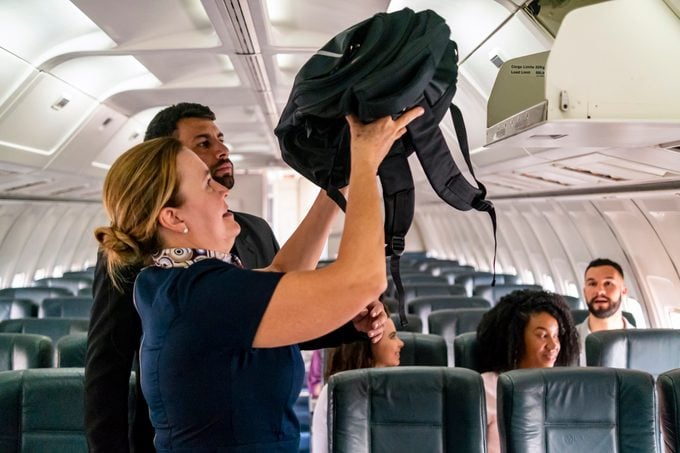
When it comes to carry-on luggage, you may be more concerned with what a TSA agent first notices about you. But flight attendants also zero in on your carry-ons, paying close attention to how many bags you have and how large they are.
One of the reasons for this attention to detail is to ensure that you’re sticking to the rules of the plane. Flight attendants are the last line of defense against passengers who might try to board a plane with too many bags or luggage too big to be a carry-on.
“I try to pay as much attention to bags as possible,” says Reginald D. Dominique, a flight attendant for Delta Air Lines. “Does anything look a little off? Is the luggage too large to fit in an overhead compartment? I also check whether bags have been tagged to be put in cargo or have hazard labels on them.”
Whether you’re distracted
Flight attendants need to know that you’re paying attention and will try to catch your eye if you’re on your cell phone. “We look to see if a passenger is texting or talking on their phone and holding up the boarding process,” says Lou Rod Cueva, a former flight attendant for a major airline. “Are they completely distracted? It’s important for the operating crew to get the aircraft out on time.”
How fit you are
Because their first concern is safety, what flight attendants notice about you has much to do with your ability to keep yourself and others safe. They’ll make a mental note of passengers who are in good shape and who can help lift heavy items and lend a hand if necessary.
“I look for customers I believe can assist me in the event of an emergency,” says Dominique. “So I pay attention to physical build. Or if someone tells me they can be of any type of help in an emergency situation, I’ll make a note of where they are seated.”
If you’re a doctor, letting the flight attendant know that when you board can help save precious time in case there is a medical emergency.
If you’re intoxicated
Had a few too many before boarding? Your flight attendant will likely pick up on that quickly. If someone boarding a plane seems like they may be drunk and disruptive, or wasted and aggressive, it’s important for a flight attendant to sniff out the signs right when the passenger boards the plane so they can take measures to avoid conflict.
“If a passenger is visibly intoxicated, they can be removed from the flight, so that is something I keep an eye out for,” says one flight attendant, who spoke anonymously because they were not authorized to speak on the record. “The last thing you want is someone drunk and erratic on a flight, so it’s best to remove them prior to takeoff.”
The flight attendant also points out that you’re not allowed to bring your own alcohol on the aircraft. In fact, taking booze from passengers is a rule all flight attendants have to follow. “Just the other day I had to take a beer away from a passenger that the gate agent must have overlooked,” they say. “It is against the law, and both the passenger and airline can get fined.”
Whether you need special assistance or extra attention
Flight attendants are also looking for anyone who might need extra help, such as infants, the elderly or someone with an injury. “I want to make sure that whoever needs special assistance is taken care of,” says Dominique. “And I want to make sure that they are seated in the correct seat and are not obstructing anything in the event of an emergency.”
Flight attendants are also keenly aware of passengers who don’t have obvious needs but still ask for accommodations. “Sometimes we’ve already noticed them at the gate talking to the agent, or they come on asking for special treatment or complaining,” says Irizarry. “In first class, we notice the ones trying to catch our attention because they want their coat hung right away, even when it’s difficult to get to during boarding.”
The status of your pet
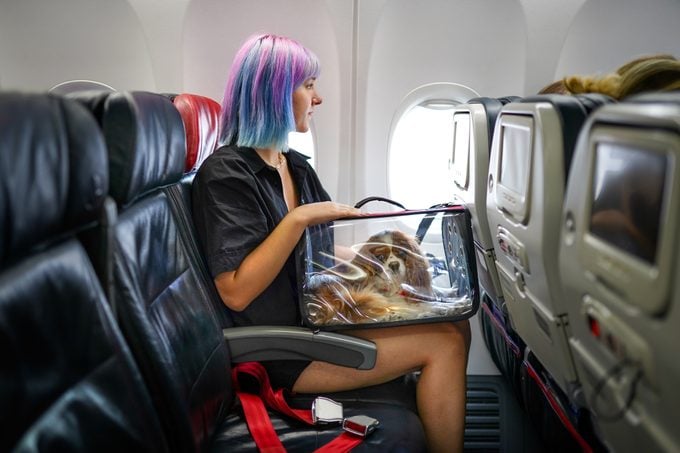
When you’re flying with a dog or cat, flight attendants will take note and likely ask you about it. “The [Federal Aviation Administration] has changed the rules, so emotional support animals no longer qualify to fly,” explains Cueva. “A service animal must be trained and registered with the airline in advance. And if you’ve paid for your pet to fly, they must remain in their carrier for the duration of the flight.”
Whether you look sick
COVID-19 is still a big concern, even with the mask mandates lifted. So if you’re not feeling well, flight attendants need to know.
“This is something that happens often, unfortunately,” says the anonymous flight attendant. “Several times, I have had passengers who say they will be fine and then, five minutes later, are vomiting at their seat. At that point, we have to remove the passenger from the plane. Their condition is only going to get worse, and rather than have to deal with it during the flight, it’s better to address the issue while on the ground with medical personnel available.”
Not only will that get the sick person the best treatment possible, but it’ll also prevent the spread of an illness to other passengers.
Additional reporting by Alexa Erickson.
Sources:
- Amy Caris, flight attendant for JSX
- Avalon Irizarry, flight attendant for American Airlines
- Reginald D. Dominique, flight attendant for Delta Air Lines
- Lou Rod Cueva, former flight attendant

